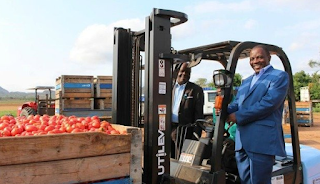Tomato Millionaires In The Making:How These 4 Smart Entrepreneurs Are Making Money from Africa’s Tomato Problems
Africa has a serious tomato problem.
Tomatoes are Africa’s most consumed fruit (or vegetable); eaten by millions of people across our continent’s diverse religious, ethnic and social groups. Both in its raw and processed forms, tomatoes are central to most African diets and remain a regular ingredient in many soups, stews, sauces and dishes across the continent.
Sadly, despite the ‘celebrity’ status of tomatoes in Africa, our continent does not provide enough tomatoes to meet its own needs. Almost every country in Africa consumes more tomatoes than it produces.
The rest is imported from outside the continent, especially from China – which is now the world’s biggest exporter of tomato products.
I would like to give you a sense of how serious and highly ridiculous Africa’s tomato situation really is, and I’ll use Nigeria as a case study.
Nigeria – Africa’s largest country by economy and population — is sub-Saharan Africa’s biggest producer of tomatoes. It produces up to 1.5 million tons of tomatoes every year, making it the 14th largest producer of tomatoes in the world.
However, despite Nigeria’s strong position in tomato production, it still spends up to $500 million – every year — to import tomato products (especially purees, pastes and canned tomatoes), making Nigeria one of the biggest importers of tomato paste in the world.
Shocking!
But how come Africa’s biggest tomato producer is also its biggest importer?
Well, it appears more than 50 percent of tomatoes harvested every year in Nigeria never make it to the market. Due to poor storage and a lack of processing options, a lot of tomatoes harvested in Nigeria is wasted.
Another reason is, in most parts of Africa, tomatoes are mainly grown by small-scale rural farmers who have limited access to good seeds, fertilizers and pesticides. They also depend on natural rainfall to grow their tomatoes which makes the harvests unpredictable and inconsistent.
Nigeria is not alone in this. This same ugly tomato situation is at play across the continent; from West and East Africa to Southern Africa.
As Africa is expected to have the world’s fastest growing population over the next 30 years, the number of people on the continent is expected to reach 2.4 billion by 2050 – that’s double its current size.
If Africa already spends nearly $1 billion on importing tomato products, how much will we be spending on tomatoes in 30 years’ time?
Unless we plan to remove tomatoes from our diets, Africa must take quick, deliberate and strategic steps to meet the domestic demand for tomatoes, and reduce its dependence on imported tomato products.
Africa still has vast uncultivated arable land that’s well suited for tomato production. With our favourable climate and abundant labour, our continent has the strategic advantage to become a net exporter of tomatoes to the global market.
Fortunately, there are already a few smart entrepreneurs on the continent who have observed the huge and lucrative gaps in Africa’s tomato market and are already making some good progress.
In this article, we’ll take a close look at some of these entrepreneurs and businesses that are positioning themselves to profit from Africa’s multi-billion dollar tomato consumption market.
Let’s meet the Entrepreneurs Solving Africa’s Tomato Problems
(Quote) (Report) 1 Like (Like) 1 Share (Share)
Re: Tomato Millionaires In The Making... by I888: 11:45am
1) Ntuseni Nesane – From Farm Labourer to Tomato Millionaire in South Africa
Dr. Ntuseni Nesane is one of the most successful tomato entrepreneurs in South Africa. Now 71 years old, he has been in the business of tomato farming for more than 40 years. With no formal education, he started his agribusiness with only a donkey and a plough.
His farm, Tshalata Farms, produces roughly 14,400 tons of tomatoes per season and employs more than 200 employees. Every year, his farm business spends up to 3 million Rand (over $200,000) on labour alone.
After working for eight years as a farm labourer, Dr. Ntuseni decided to pursue greener pastures in the city. But after a futile search for a better life in Johannesburg, he returned to the village to start a small farm with his little savings.
From the 10 hectares of land he started with, his business now farms on over 400 hectares. Although his tomatoes are primarily targeted at the South African domestic market, his business also exports tomatoes to Mozambique, Zimbabwe and Botswana.
For his outstanding work and contribution to the economic development of his country, he was awarded an honorary doctorate in Philosophy by the University of Venda in 2012.
If every African country had a few people like this, I’m sure we wouldn’t have to worry about tomatoes anymore.

No comments:
Post a Comment